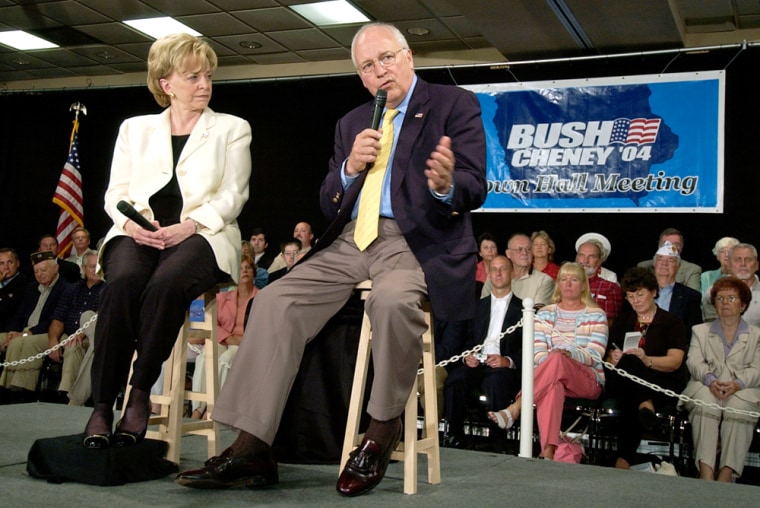Vice President Cheney on Tuesday spelled out his differences with President Bush on the volatile issue of same-sex marriage while for the first time discussing the sexual orientation of his gay daughter in a public setting.
Asked his position on the subject at a town hall meeting in Davenport, Iowa, Cheney replied: "Lynne and I have a gay daughter, so it's an issue that our family is very familiar with. . . . With respect to the question of relationships, my general view is that freedom means freedom for everyone. People ought to be able to free -- ought to be free to enter into any kind of relationship they want to."
Cheney went on to reiterate the position he first outlined in the 2000 campaign -- that same-sex marriage should be left to the states to decide. He noted, however, that Bush has endorsed a constitutional amendment preventing the states from recognizing such marriages.
"At this point . . . my own preference is as I've stated," Cheney said. "But the president makes basic policy for the administration. And he's made it."
The remarks were the furthest Cheney has gone in laying out his differences with Bush's position, and they took leaders of the GOP conservative base by surprise. Although Bush has rarely discussed his support for the amendment, conservatives viewed his stance as one of the most important social statements of his term. Republican strategists said it would motivate Christian voters to the polls even though it risks alienating swing voters.
'Mixed messages'
The Family Research Council, a conservative group with close White House ties, called Cheney's remarks disappointing. "Unfortunately, protection of our values is made more difficult when mixed messages emanate from the White House," said Tony Perkins, the group's president. "We support President Bush's commitment to a constitutional amendment on marriage, but we are left to wonder why the vice president is allowed to depart from this position when the top of the ticket is unified on all other issues."
The Human Rights Campaign, the leading gay rights lobbying group, issued an enthusiastic statement after Cheney's remarks. "President Bush must be feeling the heat," said the group's president, Cheryl Jacques. "Millions of Republican families, like the Cheneys, have gay friends and family members and are offended by President Bush's efforts to put discrimination in the Constitution."
Bush officials said Cheney has such deep and longtime goodwill among conservatives that the White House is not worried about the political fallout from the exchange.
Cheney's remark was the first time the vice president has taken note of his daughter's sexual orientation in public, officials said. Mary Cheney works for the Bush-Cheney campaign as director of vice presidential operations, responsible for her father's political travel and appearances.
Cheney's wife, Lynne, a scholar at the American Enterprise Institute who accompanied the vice president Tuesday, has previously suggested differences with the administration's policy on same-sex marriage. Lynne Cheney said on CNN's "Late Edition" in July that states should have the final say on the issue: "I think that the constitutional amendment discussion will give us an opportunity to look for ways to discuss ways in which we can keep the authority of the states intact."
'Most fundamental institution'
In February, Bush announced his support for a constitutional amendment banning same-sex marriage, calling marriage "the most fundamental institution of civilization" and saying courts were causing confusion and threatening to weaken society by changing the meaning of marriage. In July, the Republican-controlled Senate voted 50 to 48 against bringing up the amendment for a vote.
Democratic presidential nominee John F. Kerry and running mate John Edwards both oppose the amendment. Although the candidates say they do not support same-sex marriage, they defend the right of gay couples to win the legal protections afforded married couples. They also say the Constitution should not be amended to limit the rights of a certain group of people.
Explaining Bush's position at the town hall meeting Tuesday, Cheney said several judicial rulings, including those by the Massachusetts Supreme Court to legalize same-sex marriages, were beginning to make the judgment for the entire country, and that the president proposed the constitutional amendment as a result. "I think his perception was that the courts, in effect, were beginning to change, without allowing the people to be involved," Cheney said.
"I made clear four years ago when I ran and this question came up in the debate I had with Joe Lieberman that my view was that that's appropriately a matter for the states to decide, that that's how it ought to best be handled," he said.
The question on same-sex marriage was asked by a woman who wanted to know what, "in his heart," Cheney thought about the issue. His response was politely received by the group, but not with the enthusiasm of many of his other responses.
Most of the questions from the Davenport crowd of 450, who all needed tickets from the local Bush-Cheney committee to attend, were supportive and respectful. But one distraught woman sobbed as she told the vice president that her husband had been unemployed for several years after the pump factory where he worked closed with most of its jobs going abroad.
Cheney responded that U.S. companies would become more competitive if Congress made the last three Bush tax cuts permanent, and passed legislation to limit lawsuits against manufacturers and doctors.
Allen reported from Washington.
